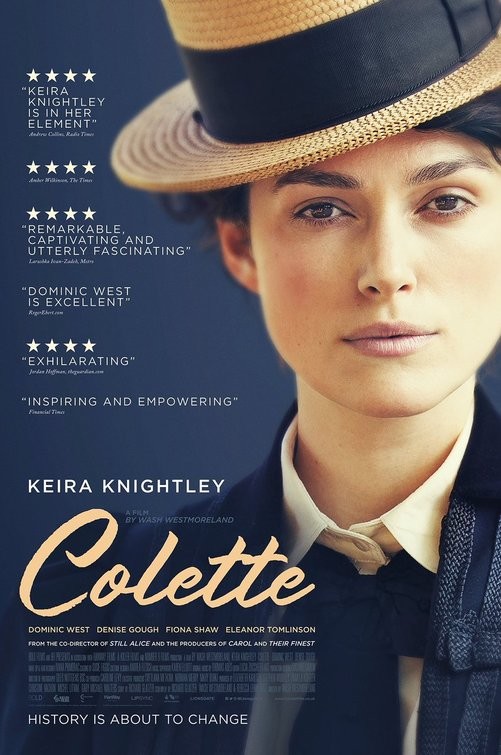
****
Whisked from her quiet, sheltered life in the country to the dizzying heights of Paris after marrying socialite Willy, Colette finds herself putting pen to paper when her husband's business begins to crumble. The resulting novel, Claudine à l'école, is a resounding success - but it isn't Colette's name on the cover...
Keira Knightley has been away from our screens for a little while. A problematic actress, she's somewhat renowned for her wooden performances and jutting jaw. However, she's back in sensational style as Colette, the remarkable woman who wrote some of the best-selling novels of the 20th Century on behalf of her husband, Willy (Dominic West). Something of a female bildungsroman, the film follows her from naive country girl to oppressed writer, fashion icon to pioneer of sexual expression - and Knightley captures each stage with subtle grace and understanding. Initially wide-eyed, she goes from rage at her husband's infidelity ('it's something men do!') to powerful voice. It's a role that could have easily become cliche or over-the-top, but Knightley pitches it perfectly each time.
Playing her philandering husband, Dominic West manages to somehow woo the audience in the same was as he initially did Colette, demonstrating a charisma and passion that's instantly engaging. As the film progresses, his insecurities, manipulative behaviour and stupidity slowly become more poisonous. It's a great praise to the screenwriters (one of who was Richard Glatzer, to whom the film is dedicated) that his actions only slowly begin to dawn on us, at the same time as Colette recognises his treachery too. Their changing relationship is intriguing to watch. At first Colette obeys his commands, but soon she becomes something of a business partner, before outstripping his authority. There's a naturalness and familiarity between West and Knightley that makes their on-screen partnership such a believable watch.
The fin de siècle detail is simply sumptuous. From the elegant, beautifully-realised costumes, to the picture-perfect scene dressing, each detail captures Paris in the heady, experimental years before the outbreak of World War One. The contrasting interiors of Colette's country retreat and Willy's inner city flat seem to act as a metaphor for the characters themselves - whilst Colette reinvents her home in bright colours, with blossoming wallpaper and life in the garden, Willy's flat crumbles as it remains the same, the cracks becoming more and more apparent. These intricacies, however small, leave you immersed in the romance of the period - a time when it felt like change really was coming and anything was possible.
Possibly a touch overlong, Colette is nonetheless an intelligent, sensitive and thought-provoking film. Gifted with a universally talented cast and outstanding attention to detail, it addresses the topics of identity, gender and creativity with a deft hand. Perfect for a chilly January evening, it makes you want to go out and seek the work of this remarkable woman - and there's no better praise than that.
Comments
Post a Comment